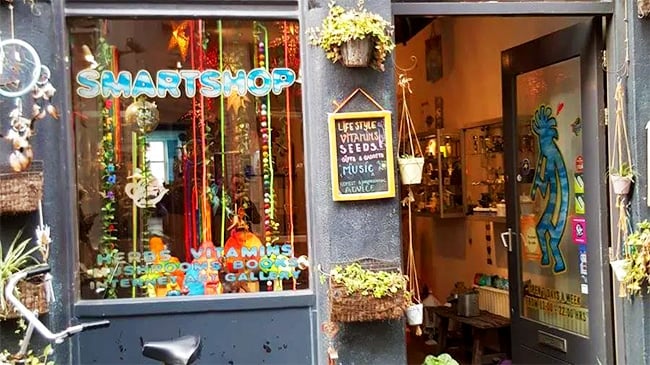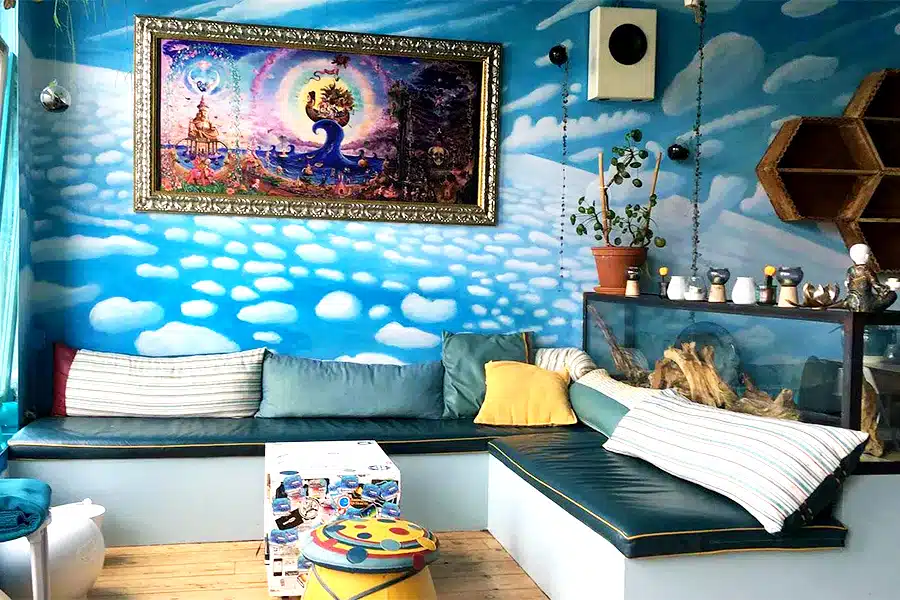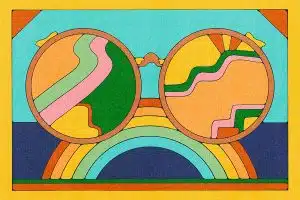The last shroom lounge in Amsterdam is hidden in one of the city’s many infamous zones of commodified debauchery, tucked between glazed-eyed tourists, souvenir shops, and leather fetish stores. Look closely, and you might spot handwritten signs saying SHAMANISM and COSMIC LOUNGE poking out of potted plants on the sidewalk, pointing towards an open door.
Step inside, and the wacky energy from the streets dissipates into an ocean of chill: the afternoon sun bathes the spacious loft in a warm pool of gold, while glistening water from the canal casts shimmering light against the art-covered walls. Two barefoot shopgirls giggle while prancing around the room, balancing crates on their heads. The shelves are stocked with books on psychedelics, candy-colored incense, tinctures of adaptogenic mushrooms, and psilocybin truffles. Downstairs, a private room doubles as a ceremony space and yoga studio. A DJ mixer sits on the counter next to the espresso machine. You get the vibe.
The spot is called Kokopelli, named after a North American fertility deity, and it’s low-key legendary: when it opened in 1994, it was one of the first “smart shops” to sell psilocybin mushrooms over the counter, and it remains a tripper sanctuary.
“Just so you know, the guy over there is tripping,” whispers the shroomtender behind the counter. She winks and points at a dude lying down on a cushioned bench, eyes closed with his lips curled into a smirk.
You won’t see this advertised on the shop’s website or social media, but Kokopelli has long been an under-the-radar safe space for tripping—everyone from seasoned psychonauts to nervous newbies are welcome to post up in their lounge, and spend a few hours shrooming while gazing out into the canal. It is one of the coolest vantage points in the city—and barely anyone knows it exists.
The shopgirl tells me this secret shroom lounge is particularly popular with tourists and teens who don’t have access to private spaces; locals prefer to trip in their own homes.
How to Grow Shrooms Bundle
Take Both of Our Courses and Save $90!
“Don’t worry,” she adds, nodding to the dude in the corner. “He’s totally chilling.”
Kokopelli is one of the last smart shops left in the city, and certainly the only one with a tripper lounge. This is because Amsterdam’s shroom and weed cafes are a dying breed, with many forced to close under new government regulations that are eroding the city’s reputation as a druggie Disneyland. The Dutch drug policy model was game-changing in the 70s, but now there are fentanyl dispensaries in Vancouver and psychedelic therapy offices in Portland. “The Netherlands is no longer inventing the future,” wrote the FT. “On cannabis, Dutch 1970s-style ‘toleration’ is being overtaken by legalization in other countries.”
In a way, Amsterdam is a European drug capital that used to be what Vancouver is now: an edgy social experiment at the bleeding-edge of progressive drug policy. Wandering around the city’s canal-lined streets in hash spliffed haze, I wondered what structural conditions precipitated the proliferation of drug dispensaries here back in the day—and why so many of these shops are now shuttering. It seems like the rise and fall of this narco Valhalla could be a valuable lesson for us all.
Weed was decriminalized in the Netherlands in 1976 as a form of harm reduction as heroin use spiked across Europe in the 70s. The Dutch drug policy model that emerged during this era was defined by its attitude of tolerance and political pragmatism; while cannabis and psychedelics were never fully legalized, the Netherlands’ “tolerance” model pioneered new ways of managing the risks of drug use and distribution, while reframing addiction as a public health concern rather than a moral consternation.
Read: Fake “MDMA Shop” Opens so People Can Experience What Buying Legal MDMA Would Be Like

When the Netherlands revised its Opium Act of 1976, it categorized drugs as “hard” vs. “soft,” with separate risk profiles and criminal penalties. (This segregation of substances remains extremely influential to how we classify drugs today, but it’s somewhat sus imo…)
Dutch policy “accepts the use of illegal drugs as inevitable in modern society,” Ed Leuw wrote in his classic essay Crime and Justice. Rather than wasting resources on penalizing individual users, law enforcement was redirected at trafficking and the higher levels of the supply system.
Authorities started turning a blind eye towards the sale of soft drugs at youth hostels, operating under the untested theory that this would help protect young people from buying weed on the streets and getting exposed to harder substances. An Amsterdam-based group of anarchist-leaning artists called Provo also helped to spark the city’s pot revolution by organizing defiantly pro-weed “happenings,” including planting cannabis seeds all over the city. Meanwhile, dealers sold pot and hash (as well as LSD, cocaine, and heroin) in nightclubs like Paradiso and Melkweg (Milky Way)—venues synonymous with Dutch hippie counterculture.
In 1972, Amsterdam’s first cannabis cafe Mellow Yellow (named after the Donovan song) opened in an abandoned bakery. Customers could buy hash and weed while drinking teas and non-alcoholic drinks, leading to the spot being called a “coffeeshop”—a tongue-in-cheek term that became shorthand for Dutch cannabis cafes. By 1999, there were 846 coffeeshops in 103 Dutch cities.
Coffeeshops challenged the Reefer Madness stereotype of weed as a dangerous and antisocial habit. Rather, getting stoned became a socially-acceptable alternative to going to a bar—you could go there to meet friends after work, or to read a book on a lazy afternoon.
“In the 80s and 90s, the Amsterdam model was an important counterbalance to the insane policies implemented by the US War on Drugs, like piss tests at work,” said Dr. J Christian Greer, a new homie who is about to teach a course on psychedelics at Stanford.
“Amsterdam’s cannabis and psychedelic scene was birthed at the same time as the city’s squatting, white bike, and anti-monarchy movements,” Christian continued. “Coffeeshops were part of this cultural effervescence.”
But Amsterdam’s reputation as a druggie Disneyland is fading. Starting in the late 1990s, an increasingly conservative political climate has spurred a reactionary backlash against the government’s “too liberal” attitude towards not just drugs, but also sex work and immigration. In 2008, after a spate of deaths and injuries related to magic mushrooms involving drug tourists (including a teenage girl who fell to her death off a bridge while tripping), the Dutch government imposed a national ban on psilocybin shrooms.
Shroom dispensaries—also known as “smart shops” because of the herbal supplements they sell—immediately pivoted to selling magic truffles, which are the parts of the psychedelic mushroom that grow underground (aka the sclerotia). Truffles also contain psilocybin, and remain legal—for now—but the ban was largely seen as a retreat from the country’s progressive drug policies, and had a chilling effect on the smart shop scene.
In 2017, the owner of Mellow Yellow wept as he shut its doors for good, due to a government mandate that all coffeeshops within 250 meters of a school had to be closed. (The historic weed cafe was near a hairdressing academy…) Hundreds of other coffeeshops were also forced to close because of this mandate, and some Dutch politicians even called for all foreigners to be banned from coffeeshops—although only one border city called Maastricht has moved forward with this anti-tourist measure. Still, a “no-growth” policy means that licenses are not being granted for the coffeeshops that have closed.
“There is a sense that Amsterdam’s drug scene is on the decline, and political tolerance has worn thin after decades of experimentation,” said Dr. Greer. “Now that the Dutch government has taken a more authoritarian turn, there’s been a contraction of coffeeshops while sex workers are being pushed out.”
I didn’t get to trip at Kokopelli’s shroom lounge (time constraints, family commitments, you know how it is…)—but I did smoke a joint and pop into a yoga class in their studio downstairs at sunset. The vibes were immaculate, and I felt a twang of mourning that these shroomy spaces might be in their twilight phase—at least in this city. Can Amsterdam work out a model that will allow them to stay competitive in the global drug economy? Where will the next drug capital of the world be? The golden era of Amsterdam’s drug dispensaries might be over as the authorities’ pragmatic tolerance collapses into reactionary hand-wringing, but it’s clear that the demand for these substances is greater than ever—and there’s bound to be a next phase.
Michelle Lhooq investigates how counterculture is evolving in the age of platform capitalism, algorithmic oppression, and drug legalization. Subscribe to Rave New World here.

DoubleBlind is a trusted resource for news, evidence-based education, and reporting on psychedelics. We work with leading medical professionals, scientific researchers, journalists, mycologists, indigenous stewards, and cultural pioneers. Read about our editorial policy and fact-checking process here.

DoubleBlind Magazine does not encourage or condone any illegal activities, including but not limited to the use of illegal substances. We do not provide mental health, clinical, or medical services. We are not a substitute for medical, psychological, or psychiatric diagnosis, treatment, or advice. If you are in a crisis or if you or any other person may be in danger or experiencing a mental health emergency, immediately call 911 or your local emergency resources. If you are considering suicide, please call 988 to connect with the National Suicide Prevention Lifeline.



